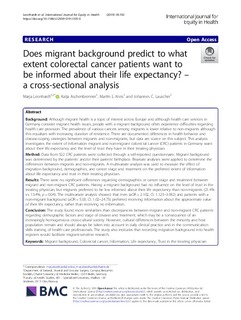| dc.contributor.author | Leonhardt, Marja | |
| dc.contributor.author | Aschenbrenner, Katja | |
| dc.contributor.author | Kreis, Martin E. | |
| dc.contributor.author | Lauscher, Johannes C | |
| dc.date.accessioned | 2019-12-13T12:57:58Z | |
| dc.date.available | 2019-12-13T12:57:58Z | |
| dc.date.created | 2019-12-09T08:14:35Z | |
| dc.date.issued | 2019 | |
| dc.identifier.citation | International Journal for Equity in Health. 2019, 18(192) | nb_NO |
| dc.identifier.issn | 1475-9276 | |
| dc.identifier.uri | http://hdl.handle.net/11250/2633241 | |
| dc.description.abstract | Background: Although migrant health is a topic of interest across Europe and although health care services in Germany consider migrant health issues, people with a migrant background often experience difficulties regarding health care provision. The prevalence of various cancers among migrants is lower relative to non-migrants although this equalizes with increasing duration of residence. There are documented differences in health behavior and disease-coping strategies between migrants and non-migrants, but data are scarce on this subject. This analysis investigates the extent of information migrant and non-migrant colorectal cancer (CRC) patients in Germany want about their life expectancy and the level of trust they have in their treating physician. Method: Data from 522 CRC patients were collected through a self-reported questionnaire. Migrant background was determined by the patients’ and/or their parents’ birthplace. Bivariate analyses were applied to determine the differences between migrants and non-migrants. A multivariate analysis was used to measure the effect of migration background, demographics, and cancer stage and treatment on the preferred extent of information about life expectancy and trust in their treating physician. Results: There were no significant differences regarding demographics or cancer stage and treatment between migrant and non-migrant CRC patients. Having a migrant background had no influence on the level of trust in the treating physician, but migrants preferred to be less informed about their life expectancy than non-migrants (21.4% vs. 13.4%, p = 0.04). The multivariate analysis showed that men (aOR = 2.102, CI: 1.123–3.932) and patients with a non-migrant background (aOR = 5.03, CI: 1.02–24.73) preferred receiving information about the approximate value of their life expectancy, rather than receiving no information. Conclusion: The study found more similarities than discrepancies between migrant and non-migrant CRC patients regarding demographic factors and stage of disease and treatment, which may be a consequence of an increasingly homogeneous cross-cultural society. However, cultural differences between the minority and host population remain and should always be taken into account in daily clinical practice and in the communication skills training of health care professionals. The study also indicates that recording migration background into health registers would facilitate migrant-sensitive research. | nb_NO |
| dc.language.iso | eng | nb_NO |
| dc.publisher | BioMed Central | nb_NO |
| dc.relation.uri | https://equityhealthj.biomedcentral.com/articles/10.1186/s12939-019-1105-0 | |
| dc.subject | migrant background | nb_NO |
| dc.subject | colorectal cancer | nb_NO |
| dc.subject | information | nb_NO |
| dc.subject | life expectancy | nb_NO |
| dc.subject | trust in the treating physician | nb_NO |
| dc.title | Does migrant background predict to what extent colorectal cancer patients want to be informed about their life expectancy? – a cross-sectional analysis | nb_NO |
| dc.type | Journal article | nb_NO |
| dc.type | Peer reviewed | nb_NO |
| dc.description.version | publishedVersion | nb_NO |
| dc.rights.holder | Open Access | nb_NO |
| dc.source.pagenumber | 1-11 | nb_NO |
| dc.source.volume | 18 | nb_NO |
| dc.source.journal | International Journal for Equity in Health | nb_NO |
| dc.source.issue | 192 | nb_NO |
| dc.identifier.doi | https://doi.org/10.1186/s12939-019-1105-0 | |
| dc.identifier.cristin | 1758000 | |
| cristin.unitcode | 251,3,0,0 | |
| cristin.unitname | Fakultet for helsefag | |
| cristin.ispublished | true | |
| cristin.fulltext | original | |
| cristin.qualitycode | 1 | |
